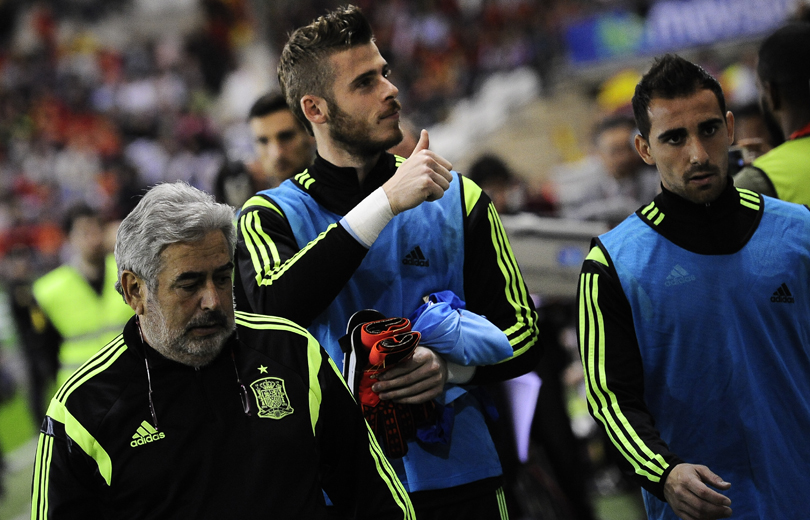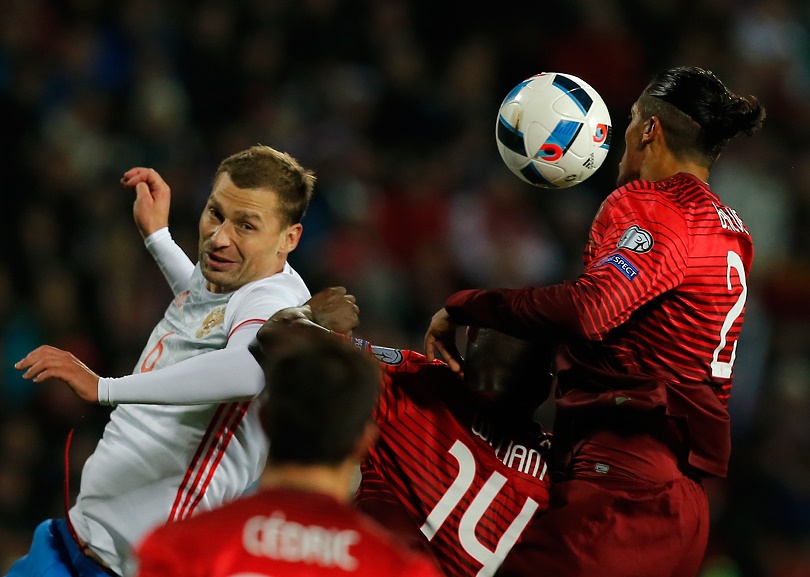8 things you didn’t know you didn’t know about European football this season
From the Slovenian club with more foreign players than Chelsea, to the land of giants and Nicklas Bendtner, FFT analyses the statistics to find out the surprising reality of European football in 2015/16...

1. Which clubs look abroad the most?
Something you won't be surprised to hear: the Premier League has the second-highest percentage of expatriates of any of the top 31 leagues in Europe, according to statistics released this week by the CIES Football Observatory and their Digital Atlas. Less expected news: the club with the highest percentage is a mid-table team from Slovenia.
They might not have been getting many headlines across Europe – in fact we'll rephrase that, they haven't been getting any headlines across Europe – but NK Zavrc have quietly been amassing players from countries around the continent. Well, one country mainly: 18 of their squad hail from Croatia, an arduous journey of all 300 metres from the border to Zavrc's home stadium, just inside Slovenia. They have recruited from elsewhere too – from Bosnia, Albania, Montenegro, Slovakia, Austria and Spain, with former Liverpool and Manchester City winger Albert Riera on the books for a reported wage of €2,000 a month. Don't spend it all at once, Albert.
Martes: toca historia de uno de nuestros emigrantes. Nos vamos a Eslovenia con Albert Riera November 3, 2015
To be fair to NK Zavrc, they do have four Slovenian players too, meaning their expat ratio is only 88%. Roma are next with 85.2%, while Chelsea (83.3%) are third. Manchester City (74.1%) are 12th, three places behind Slovakian side ViOn Zlate Moravce (76%), whose squad contains six more of the marauding Croatians and three of the Slovenians who maybe might have preferred to play for NK Zavrc.
Arsenal (72%) are 19th on the list, just behind Inverness Caledonian Thistle (73.1%), a club with 14 Englishmen and only six Scots. Bournemouth are the only Premier League club with more Englishman in their first-team squad, of which 33.3% are expats.

The Premier League's overall proportion of foreign players (59.9%) is surpassed only by Cyprus, where 66.4% of players have come from overseas. Serbia (15.7%) have the lowest levels of expatriates, while Finland's HIFK, Czech club Pribram and Gomel of Belarus don’t have a single foreigner in their squads.
2. Which team’s got the oldest mob?
The best features, fun and footballing quizzes, straight to your inbox every week.
Despite their advancing years the first yard of every game is in their heads, Teddy Sheringham style, and they currently sit 14th in Serie A
As of October 1, the date around which the CIES study was based, the oldest squad in European football officially belonged to Serie A side Chievo. Their average age then was a veritably decrepit 30.6 years and scientists have officially calculated that those same players are even older now – by almost two months in fact. That's science for you.
Chievo's average age has much to do with the presence of the likes of Albano Bizzarri (38), Dario Dainelli (36), Sergio Pellissier (36), Gennaro Sardo (36), Massimo Gobbi (35), Alessandro Gamberini (34), Giampero Pinzi (34), Walter Bressan (34) and former West Brom defender Bostjan Cesar (33) among their ranks.
Despite their advancing years the first yard of every game is in their heads, Teddy Sheringham style, and they currently sit 14th in Serie A. That's five places above their city neighbours and second-oldest squad in Italy, Verona, for whom Luca Toni is still attempting to battle on. He's 38, but last season still shared the Capocannoniere with Inter’s Mauro Icardi.

Chievo's average age is a full 1.7 years more than the next highest in Europe, Turkey's Akhisar Belediyespor (28.9), whose squad includes a 34-year-old Lomana LuaLua. Stoke and West Brom (average age 28.7) are the veterans of the Premier League and the joint-ninth oldest squads in Europe.
The pups of Croatia's Hajduk Split and Slovakia's Senica are the joint-youngest squads on the continent, with an average age of 22.7. Tottenham (average age 24.4) are the youngest in the Premier League, just ahead of Liverpool (25). The age of the average Premier League player is 26.9, the fifth-highest in Europe. Turkey (27.3) top the list.
3. Who’s standing tall above the rest?
The Bundesliga club peer over the rest with an average height of 187cm, or nearly 6ft 2in
It will probably come as no shock that Stoke have the tallest squad in the Premier League, with an average height of 184.8 centimetres. Well, Peter Crouch (203cm) does still play for them (just). Chelsea, Crystal Palace and Watford are next, but it's the players of Wolfsburg who find out it's raining first.
The Bundesliga club peer over the rest with an average height of 187cm, or nearly 6ft 2in – meaning that their self-proclaimed best player in the history of the universe, Nicklas Bendtner (194cm), is indeed one of the giants of European football.
Much like John Cleese on The Frost Report, Wolfsburg look down on Czech club Sigma Olomouc and Austrians SV Mattersburg (185.6cm) in joint-second, although Bulgarian side Ludogorets Razgrad are the Ronnie Corbetts of Europe with an average height of only 178cm (about 5ft 8in). Barcelona have the joint-fifth smallest squad at 178.7cm, while Everton and Manchester City are the tiniest in the Premier League.
Overall the Premier League is the 14th tallest in Europe (a proud boast that's surely worth adding to those Sky Sports adverts). Croatia lead the way, while Israel is Europe's smallest league.
Read on for the surprising Premier League side with the fewest percentage of internationals...
4. Who’s repping all the internationals?
By quite some distance, the Premier League has a higher percentage of active international players than any other league in Europe. A total of 41.4% of players in England's top flight have been capped since the start of the season – Germany's Bundesliga is the next highest with only 30.9%. Russia, Italy, France and Turkey follow before La Liga arrive in seventh place with 19.6%. Slovenia are last with 2%: presumably those Zavrc players aren't getting a look-in with the Croatia squad, then.

The club with the greatest percentage of active internationals is Manchester United, with 72% of their players capped by their respective countries in recent months. CSKA Moscow (71.4%) are second ahead of Real Madrid, with Premier League sides Chelsea, Arsenal and Tottenham completing the top six. West Ham (20%) have the lowest percentage of internationals of any Premier League club.
5. Who keeps their feet under the table?
The higher salaries in England probably help, and Premier League players move club only every 2.82 years on average. That puts England ahead of the rest in Europe
Serbia's top division may not contain many expatriates but their players still like to move around a bit, changing clubs every 1.71 years on average. At the very other end of the scale is the Premier League, where players like to get comfy and stay put for a little longer. The higher salaries in England probably help, and Premier League players move club only every 2.82 years on average. That puts England ahead of the rest in Europe, with Norway second and Russia third.
The club that leads the way, though, is CSKA Moscow, perhaps mainly due to the fact that Sergei Ignashevich and the Berezutski twins seem to have been playing for them for about 177 consecutive seasons now. The likes of Igor Akinfeev, Alan Dzagoev and Georgi Schennikov have stuck around for a while too, taking the average stay of a player at CSKA to a massive 5.67 years. Real Sociedad (4.62) are second, although David Moyes will tell you that their managers don't last quite as long.

Everton (4.14) are sixth in Europe behind Sweden's Atvidabergs, Ukraine's Shakhtar Donetsk, and Barcelona. Shakhtar's average is all the more impressive considering their city has been besieged by war and the club have had to move the best part of 800 miles to a new base at the other end of the country in Lviv. Players at fellow Ukrainian side Chornomorets Odessa (1.20 years) have the lowest average stay in Europe.
Arsenal (3.80) and Chelsea (3.33) are the next highest in the Premier League, with Sunderland (2.24), West Ham (2.27) and Tottenham (2.28) the lowest.
6. Which Chelsea player bucks the trend?
The Premier League fares badly for the average number of youth players per club handed a debut between July and October this year
The Premier League fares badly for the average number of youth players per club handed a debut between July and October this year. Just 0.4 players per club, eight players in total, were given their Premier League bows. Only Greece, Cyprus, Spain and Turkey have a lower average. Ukraine have the highest average with 2.29 players per club, with Metalurg Zaporizhya giving debuts to 11 youngsters.
Of the players to make their debuts in that period, Italian midfielder Mario Piccinocchi has got the highest percentage of game time, featuring for Swiss side Lugano in 83.9% of their match minutes this season while on loan from Vicenza. Chelsea's Dominic Solanke is 18th on the list, although he has had to travel to the Netherlands to feature in 53.6% of Vitesse Arnhem's game time in the Eredivisie.

Find out which clubs love a new signing more than Jim White...
7. Who wins the club-trained crusade?
The Premier League's average of 11.7% is the sixth-lowest on the continent, with Turkey bottom of the list
Athletic Bilbao's policy of only selecting players with an affiliation to the Basque region means they stand out like a sore thumb in the figures for the highest percentage of club-trained players – those who have spent at least three seasons at the club between the ages of 15 and 21.
A total of 63% of Athletic's players are club trained, and while that only puts them fourth in the list of all European clubs, it makes them pretty lonely in western Europe.
Gomel, Europa League opponents for Liverpool in 2012, lead the way with a massive 91.7% – not that it's doing them any good this season. They're bottom of Belarus's top flight, six places behind Neman Grodno, who are second on the club-trained list. Czechs Sigma Olomouc are third.

Eastern Europe and Scandinavia dominate the list: the only other club in a western European league with an average of above 50% is La Liga side Las Palmas, perhaps not surprising considering they play in the distant Canary Islands.
Tottenham's average of 32% is the highest in the Premier League, putting them just ahead of Arsenal and Manchester United. Bournemouth and Swansea are bottom, with no club-trained players in the CIES stats. The Premier League's average of 11.7% is the sixth lowest on the continent, with Turkey bottom of the list.
8. Who loves a new signing?
The proliferation of transfers is possibly in part due to the fact that there were a stunning 44 managerial changes in the Romanian top flight last season
Hold on to your hats, people. If you think Premier League clubs like a new signing, you'd be very wrong.
English sides have made an average of only 9.8 signings each since the start of the year – putting them just 18th in the European list. That's higher than the likes of Sweden (7.4) but trailing in the wake of Romania, whose clubs have made an average of 14 signings each.
Jim White has it easy, then. Spare a thought for the television presenters who have to keep track of the action on deadline day in Romania as 'CONFIRMED: VALENTIN LAZAR JOINS CONCORDIA CHIAJNA ON LOAN'. Although at least Jim's yellow tie would make a lot more sense in Romania.

The proliferation of transfers is possibly in part due to the fact that there were a stunning 44 managerial changes in the Romanian top flight last season, although we should point out that Liga I is also the very same league where almost half of the clubs went into insolvency last season. Maybe take it a bit easier on the signings, chaps. But they have nothing on Serie A side Bologna, who have made 23 signings – a number 11 higher than the number of points they've amassed so far this season.
Watford's total of 17 is the highest in the Premier League ahead of Aston Villa (15) and West Ham (14). Arsenal, quelle surprise, have made the fewest signings, with just four – two fewer than Everton.

Chris joined FourFourTwo in 2015 and has reported from more than 20 countries, in places as varied as Ivory Coast and the Arctic Circle. He's interviewed Pele, Zlatan and Santa Claus (it's a long story), as well as covering the World Cup, AFCON and the Clasico. He previously spent 10 years as a newspaper journalist, and completed the 92 in 2017.
 Join The Club
Join The Club





